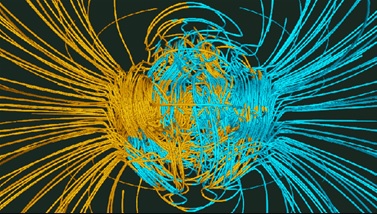Parted from the scene of old disasters
a magnet pulling one memory in two directions
Sometimes I get stuck when reading Pushcart. I can sense power in a work, but I don’t know what it “means” or how to talk about it. Sometimes I’m just intimidated by a famous name. And sometimes I feel as though I’m treading on sacred ground, and I’m unsure of the appropriate attitude. This is most pronounced when, as in this case, I read the work of a recently deceased poet.
Here is again where I wish I better understood how to “really” read poetry. But all I can do is record my own observations and reactions, and hope that I accumulate some wisdom from the overall experience.
The first thing I noticed with this poem was how the punctuation isn’t visible, but is still there via line breaks. I see very little enjambment (if any) in this poem; each line is a clause unto itself. The ghost of punctuation, unseen, still directs the reading of the poem.
The sense of point-of-view is explicit in the poem, right from the beginning – a magnet pulled in two directions. What a great image: north and south; yet north and south attract each other, so the two poles also unite (I don’t think actual magnets work that way; I have a few physics courses to take before I can understand just how inappropriate that interpretation may be). I wonder if the lines of the couplets are the two directions: hand/mind, puddle/stone; we/you; the braiding of hair “into a soft basket”, a wonderfully intimate image, coupled with holding “nature’s charms at arms length”. And why is the apostrophe missing in “arms”? Not possessive, but plural?
The phrase that jumps off the page at me is “every angled enmity” both because of the initial vowels, and because of the tongue-twisting nature of it. And then, the brow leads to slope leads to axis leads to lines: from concrete body to abstract figures, through serial associations that circle back to a lined brow. The magnet: two poles at opposite ends that pull together.
I know these roads by heart and all the ways back in
An arrow strung up like a party favor points the way
There’s no capitalization for quite some time, either, other than the first word, and “I”. So when I came to a capital, it seemed like it must be a very significant placement, perhaps a section break – but it occurs in the second line of a couplet, then is followed by three repetitions of “I want”. How does that work? In a poem about a lost loved one, does a capital signal a “break” in the couple, as well as the couplet? It comes after finding “all the ways back in”, a phrase that I use quite a bit. The magnet again: the opposite fields leap from the poles, but find their way back to each other.
To read this particular poem, knowing that the poet passed away not long ago at the age of 35: sacred territory. Poem about memory, ghost, magnet, as memory, ghost, magnet pulling in two directions – the sorrow of loss and the joy of art – then finding its way back to unity. Here is where I wish I knew how to really read poetry.


I don’t know how many times I said “I wish I knew how to really read poetry” while in grad school. And I was in a graduate writing program I had been accepted to as a poet. I often had no idea what another student’s poem was “about” or what it meant. That’s a characteristic of poetry of the last 50 years or so, of course, that either 1) it doesn’t have a “discursive” meaning, and works more like music or painting, or 2) the discursive meaning is intentionally very difficult to unearth, as in T.S. Elliot. But I still like poems where I have a shot at coming up with something, some theme I could express in other words than the poem does–even if those words are hopelessly banal compared to the poem itself. Which is why I stopped writing poetry and switched to fiction.
Hi Jacob – I wonder, though – if it’s possible to express a poem in another way, does it work as a poem? Isn’t the point of poetry to use language (and visual impact as well, white space and such) to add meaning to mere statement, to lift above translation into something more soul-felt? I often love writing I don’t understand, for reasons I can’t identify, but something touches me. I’m not sure if that’s considered poetically “valid” but it works for me.
My problem comes when I try to write a blog post about something when I don’t understand how it works. But then again, I’ve been pretty clear all along that this is my classroom, with me as both teacher and sole student, fumbling towards some kind of meaning.